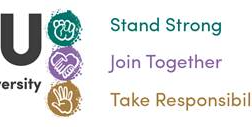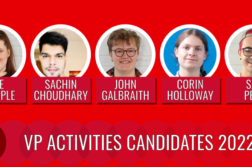Wessex Scene interview Jordan Hickey, who is running for the role of VP Education and Democracy in the 2021 SUSU Leadership Elections.
Why have you decided to run for the role of VP Education & Democracy?
Throughout this academic year, I have seen a sudden decline in the quality of education that students are receiving, and what is a Russell Group university without good-quality education? This needs to be at the forefront of everything the university is doing, but they seem to have compromised on the quality of education.
So many people are struggling this year with a multitude of other commitments alongside their studies, and though they put their all into their work, the university is not giving the same amount of effort back. I feel passionate about creating change and supporting students through these trying times, therefore, I have decided to run for this role.
What experience do you have that would make you an excellent fit for the role?
I have experience as a student ambassador in secondary school. I feel this role will have prepared me for many of the same challenges that I will face. For example, I helped bring the issue of long lunch queues to the school to develop a new system that staggered lunch breaks to allow shorter queue times. This experience lays a solid foundation for the work I will be doing as VP of education and democracy, which will help me provide a positive and influential force within the role.
What are the main problems you identify with the current role of VP Education & Democracy, and how would you fix them?
I have not seen as much change or action as I would have liked to this year. SUSU’s focus as a while seems to be on promoting clubs whereas it should be to focus on students’ needs.
For example, even students at risk or those with other mitigating factors were still made to come into labs or else they would fail. This shows a blatant disregard for those students’ health and safety and a lack of leniency for those who are suffering during this pandemic, but no change was made to protect us. Due to this, the students’ trust and engagement in the Students’ Union continues to dwindle. I will make sure to change the focus of SUSU to be not only on clubs and activities, but also on education.
There is also a lack of coordinated action from the Union in making change in relation to education, and I intend to solve these problems by taking a hard stance on the issues brought by students. I will focus on promoting the ‘you make change’ initiative – by doing this and enacting positive changes that students want to see, I will be able to increase the trust students have.
The coronavirus pandemic has had a large impact on many students in various ways ranging from declining mental health to falling ill close to university deadlines. What will you do to ensure the fair and equal treatment of students who experience mitigating circumstances due to Covid-19?
One way to ensure fair and equal treatment of students is by putting a no-detriment/safety net policy into place, as I firmly believe that no students should be penalised because of the pandemic. The struggles people face due to the pandemic have not stopped purely because we have been in this situation for a while; if anything, they are only getting worse. A no-detriment policy will be essential for as long as the pandemic continues, therefore, I will lobby for a present and retrospective no-detriment policy.
As well as making sure such a policy is implemented, I also want to improve the current special considerations process. Though some changes have been made, a few issues have been overlooked. Firstly, the issue of who can get special consideration and its possible outcomes – these are currently tailored towards students who are at risk of failing a module, whereas even students who are doing well should be allowed to get it. They may have been able to get a first if not for certain circumstances, so even if they receive a 2:1 in the end, as they have been unfairly affected by those circumstances, it is only fair to award special considerations to them.
As such, more outcomes such as re-sits for tests with disappointing marks below the students’ average attainment should be implemented so that the special considerations process better supports all students.
In the past couple of years, interest in the Union Elections has steadily declined, and this year, the voting arrangements have changed in order to account for this decline. What will you do to help improve engagement in student politics and overall?
I believe that the decline in interest in student politics correlates with the students’ feeling that they are not truly heard. This may make them feel that nothing will change whether they engage or not.
For this reason, I will focus on making two changes:
- Ensuring the students feel heard by listening to them and improving the quality of their communication with SUSU
- Promoting the student elections more and making students aware that if they want their issues listened to, then they need to engage more in student politics so they elect the right person.
I feel that the key to improving students’ trust lies in enacting change and keeping the whole student body informed in what change candidates are trying to achieve for them. By proving that such change can happen, I believe significant improvements to engagement can be made.
Many students have expressed concerns about a decline in education quality due to the coronavirus pandemic and the move to online learning. How do you propose to combat such issues?
I have also witnessed this decline in quality first-hand. Most of the lecturers, unlike us, did not grow up with technology, so the quality of online teaching is worse than if we were able to be taught in person. I feel that educating the lecturers on how they can better use technology to enhance their teaching would be the first thing to do. This can make teaching more accessible and improve its quality. There seem to be constant small mistakes made due to their lack of understanding of technology, such as putting up the wrong due dates or forgetting to record live lectures, which makes clear that there is a lack of quality control. I will also be focusing on finding ways to ensure that these mistakes are not made by lecturers.
There also seems to have been an increase in independent work and less support from the university. I will be working with SUSU, academic societies and the university to increase aid available to students. I feel that when we do return to in-person teaching, a university-wide policy must be implemented to record lectures. We are here to learn, and when teaching hundreds of people at once, the lecturers cannot be sure if everyone has understood. As students can repeatedly go over lectures, putting recordings of all lectures online could help students improve their grades, will improve the quality of education and will even give the university a better standing. I see no reason why the recording of lectures should not continue for all subjects after the pandemic.
How will you support the academic interests of students who are typically side-lined, such as Joint Honours students, disabled students and postgrads?
All students’ problems are essential to be addressed, and it is crucial to work closely with Joint Honours officers and Postgrad officers. They will be able to give me a good understanding of the support that is needed for their students and will help me make the necessary change to support them.
Similarly, I aim to be working closely with the VP of Welfare and Community to help enact positive changes for disabled students. They will be more knowledgeable of the issues that disabled students are going through and any educational support they may require, which will help me become aware of them and take action to address them. One of the ways I would like to help disabled students is by increasing the support available to them both financially and otherwise, and making the current support better signposted to make sure they are not missing out on all the available help.
If you were elected, what would be your top three areas of focus?
-
- Improving student support systems and pushing for no-detriment policy and better special considerations
- Enacting the change students want to see by taking their feedback via ‘You Make Change’ and working with all student officers to help them make changes within their courses
- Truly unionising the Union as one strong body that can successfully oppose the university’s decisions and hold those within it to account.
In your manifesto you state that SUSU lacks the power to make student voices heard. How do you think increased promotion of the You Make Change initiative would strengthen SUSU’s power and voice?
SUSU lacks power in enacting change, the reason being that as their engagement declines, the strength of the union declines. This is because the union’s power relies on the students’ support, so in order to make the union’s existence worthwhile, we must show that students are passionate about a certain matter and agree that change must be made.
‘You make change’ is one of the best ways for students to get their voice across to SUSU sabbatical officers, so promoting and improving this will help give power to the change we intend to make as we can show the university we have strong support. By doing this and enacting changes, we can show the rest of the student body that we can be trusted and we are capable of improving their education and other matters.
By merely making this one change, we can improve engagement and consequently make the union formidable which is very important because the university does not seem to have enough respect or care for the union at present. This respect and strong opposition will ensure the university is held accountable for decisions that negatively affect students and their education.
How do you propose to increase student engagement with SUSU?
The problem is not that students aren’t engaging, instead, it is the fact that they do not realise the potential of SUSU to be more than just a club or activity running organisation. This is a union that can enact actual change within their students’ education, so we must reassure and show them that the union is more than what it seems to be.
I will try to improve engagement in the political side of SUSU which can be achieved by promote the fact that they can enact change heavily instead of focusing completely on societies and clubs. Then I will focus on encouraging students to speak up and get them to trust that they don’t have to suffer in silence as we CAN enact change. Once this is promoted and some people are involved, the union needs to constantly be pushing for change and never be complacent. SUSU should make big and impactful change within the university right now because there is so much need for change. Tell them you can, show them you can and from there on in, students will see the union for what it truly is and will be more engaged.



